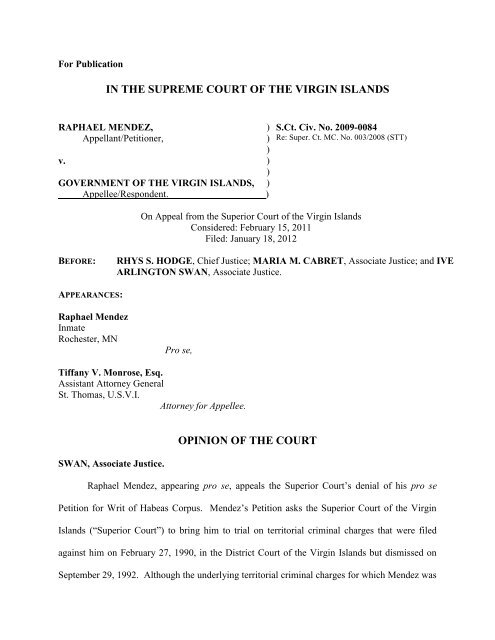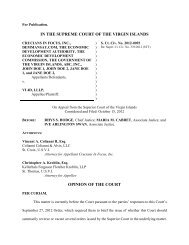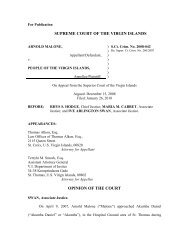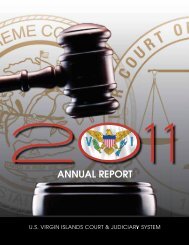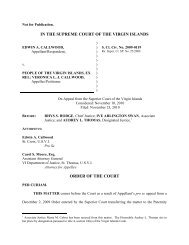IN THE SUPREME COURT OF THE VIRGIN ISLANDS OPINION OF ...
IN THE SUPREME COURT OF THE VIRGIN ISLANDS OPINION OF ...
IN THE SUPREME COURT OF THE VIRGIN ISLANDS OPINION OF ...
You also want an ePaper? Increase the reach of your titles
YUMPU automatically turns print PDFs into web optimized ePapers that Google loves.
For Publication<strong>IN</strong> <strong>THE</strong> <strong>SUPREME</strong> <strong>COURT</strong> <strong>OF</strong> <strong>THE</strong> VIRG<strong>IN</strong> <strong>ISLANDS</strong>RAPHAEL MENDEZ, )Appellant/Petitioner,))v. ))GOVERNMENT <strong>OF</strong> <strong>THE</strong> VIRG<strong>IN</strong> <strong>ISLANDS</strong>, )Appellee/Respondent. )S.Ct. Civ. No. 2009-0084Re: Super. Ct. MC. No. 003/2008 (STT)On Appeal from the Superior Court of the Virgin IslandsConsidered: February 15, 2011Filed: January 18, 2012BEFORE:RHYS S. HODGE, Chief Justice; MARIA M. CABRET, Associate Justice; and IVEARL<strong>IN</strong>GTON SWAN, Associate Justice.APPEARANCES:Raphael MendezInmateRochester, MNPro se,Tiffany V. Monrose, Esq.Assistant Attorney GeneralSt. Thomas, U.S.V.I.Attorney for Appellee.OP<strong>IN</strong>ION <strong>OF</strong> <strong>THE</strong> <strong>COURT</strong>SWAN, Associate Justice.Raphael Mendez, appearing pro se, appeals the Superior Court’s denial of his pro sePetition for Writ of Habeas Corpus. Mendez’s Petition asks the Superior Court of the VirginIslands (“Superior Court”) to bring him to trial on territorial criminal charges that were filedagainst him on February 27, 1990, in the District Court of the Virgin Islands but dismissed onSeptember 29, 1992. Although the underlying territorial criminal charges for which Mendez was
Mendez v. Gov’t of the V.I.S.Ct. Civ. No. 2009-0084Opinion of the CourtPage 2 of 15originally arrested were dismissed almost two decades ago, Mendez remains civilly committedby an Order of the United States District Court for the Eastern District of North Carolina(“District Court of North Carolina”), pursuant to title 18, section 4246 of the United States Code.For the reasons elucidated below, we will affirm the Superior Court and deny Mendez’s appealbecause the Superior Court lacks subject matter jurisdiction over Mendez’s Petition for Writ ofHabeas Corpus and over his federal civil commitment.I. FACTS AND PROCEDURAL HISTORYBased on the sparse record before this Court, the events alleged in the criminalInformation underlying this civil case occurred as follows: On February 20, 1990, an assaultoccurred at a housing project on St. Thomas, U.S. Virgin Islands. (App. at 1.)Severaleyewitnesses, including the purported victim, Byron Martin, alleged that Raphael Mendezapproached Martin while armed with a sawed-off shotgun. (Id.) It is further alleged that Mendeztold Martin that Martin “had taken away his spirit and he wanted it back.” (Id.) Ostensibly,Mendez then fired one shot at Martin, which penetrated the upper right side of Martin’s right leg.(Id.) Thereafter, Mendez allegedly reiterated his request to Martin for the return of Mendez’sspirit, while simultaneously pointing his shotgun at Martin a second time; this time the shotgunwas aimed at Martin’s head. (Id. at 1-2.) Mendez argues that he desires to be brought to trial inorder to submit evidence that Martin was engaged in “the prohibited practice of spiritualism” andfurther, to prove that he shot martin while acting in self-defense. (Br. of Appellant 6.)On February 27, 1990, the United States Attorney filed a three-count Information in theDistrict Court of the Virgin Islands, which charged Mendez with Count I, Assault in the ThirdDegree, in violation of title 14, section 297(2) of the Virgin Islands Code; Count II, Possession
Mendez v. Gov’t of the V.I.S.Ct. Civ. No. 2009-0084Opinion of the CourtPage 3 of 15of a Firearm During the Commission of a Crime of Violence, in violation of title 14, section2253(a) of the Virgin Islands Code; and Count III, Unlawful Possession of a Sawed-Off Shotgun,in violation of title 14, sections 2253(b) and 2253(d)(2) of the Virgin Islands Code. (App. at 4-5.)Mendez was arraigned the following day. Subsequently, a motion was made requesting apsychological evaluation of Mendez. (Id. at 6.)After reviewing Mendez’s Mental Health Summary, the District Court of the VirginIslands held a competency hearing on July 24, 1990, which resulted in a July 30, 1990 Ordermemorializing its finding that Mendez was competent to stand trial. (Id.) However, on August 2,1990, the District Court granted Mendez’s Motion for Dismissal of Count III, UnlawfulPossession of a Sawed-Off Shotgun in violation of title 14, section 2253(b) and 2253(d)(2) of theVirgin Islands Code. On August 20, 1990, Mendez was committed to the custody of the UnitedStates Attorney General for another competency and sanity evaluation, thereby prompting histransfer to the Mental Health Division of the Federal Correctional Institution in Butner, NorthCarolina (“FCI-Butner”). 1 (Id.) Additionally, on January 22, 1991 Mendez and the Governmentof the Virgin Islands stipulated to his return to FCI-Butner. (Id. at 7.)On January 30, 1991, the Information was amended with a new Count III chargingMendez with Possession of a Firearm by a Felon. Gov’t of the V.I. v. Mendez, Crim. No. 90-43,Civ. No. 92-235, Civ. No. 94-27, Civ. No. 92-80, 1995 WL 458439, at *1 n.1 (D.V.I. 1995). Atthe January 30, 1991 arraignment on the amended charges, the District Court of the VirginIslands found that Mendez was not competent to be arraigned, whereupon he was returned to1 Although Mendez is committed pursuant to the authority of the District Court of North Carolina, the physical siteof his civil commitment is currently in Rochester, Minnesota.
Mendez v. Gov’t of the V.I.S.Ct. Civ. No. 2009-0084Opinion of the CourtPage 4 of 15FCI-Butner for examination, hospitalization and treatment. (Id.) A psychiatric evaluation ofMendez was filed with the District Court of the Virgin Islands on February 11, 1991. (Id.)On June 4, 1991, J. T. Hadden, Warden of FCI-Butner (“Warden Hadden”), wrote to theDistrict Court of North Carolina which had committed Mendez to the Mental Health Division ofthe prison following his transfer to FCI-Butner. Hadden stated that Mendez’s forensic evaluationrevealed that he is:not competent to stand trial and is not likely to regain his competence in theforeseeable future due to mental illness. It is our belief that his release to thecommunity at this time would present a substantial risk of danger to others or theproperty of others; therefore, we are proceeding under Title 18, U.S. Code,Section 4246(a) to stay his release from custody of the Attorney General until asuitable conditional release plan can be arranged.(Id. at 8.) A Certificate of Mental Disease or Defect and Dangerousness of even date, signed byWarden Hadden, provided substantially the same information and requested a hearing todetermine whether Mendez should continue to be committed at FCI-Butner.Relying on thisinformation, and noting that a federal public defender had been appointed to assist Mendez inopposing the Government’s recommendation, the District Court of North Carolina issued anOrder filed on July 29, 1991 appointing a doctor to examine Mendez and to review his pastmedical records. On September 29, 1992, all charges against Mendez in the District Court of theVirgin Islands were dismissed because he was found to be incompetent to stand trial. Mendez,1995 WL 458439, at *1.Subsequently, Mendez was granted conditional release. 2 However, on November 4,2002, a revocation hearing was held before the District Court of North Carolina. The federalgovernment recommended that “Mendez’s [c]onditional [r]elease be revoked based on the2 The precise date of Mendez’s conditional release cannot be ascertained from the limited record submitted onappeal.
Mendez v. Gov’t of the V.I.S.Ct. Civ. No. 2009-0084Opinion of the CourtPage 5 of 15ground [that] his continued release would create a substantial risk of bodily injury to anotherperson or serious damage to property of another.” (App. at 13.)At the hearing Mendezchallenged the jurisdiction of the District Court of North Carolina to “dismiss territorial . . .charges to impose federal charges[.]” (Id. at 12.) The court summarily denied Mendez’s oralmotion without explanation.On February 6, 2008, Mendez filed a pro se Petition for Writ of Habeas Corpus in theSuperior Court. In his Petition, Mendez asked to be returned to the Virgin Islands to testify at atrial on the underlying criminal charges which led to his arrest and, indirectly, to his commitmentat FCI-Butner. (Mem. Op. and Order of August 18, 2009 at 1.) Mendez asserts that Parrott v.Gov’t of the V.I., 230 F.3d 615 (3d Cir. 2000) supports his contention that the Superior Court hasjurisdiction to grant his Petition. (Mem. Op. and Order of August 18, 2009 at 2.) On August 18,2009, the Superior Court entered a Memorandum Opinion and Order dismissing the Petitionbecause “the Superior Court of the Virgin Islands has no jurisdiction over Mendez’s habeascorpus petition[.]” (Id. at 5.) On September 3, 2009, Mendez filed a Notice of Appeal datedAugust 24, 2009, appealing the Superior Court’s dismissal of his Habeas Petition. (Notice ofAppeal 1.)II.ISSUESIn his Notice of Appeal, Mendez states that he “is appealing the August [18], 2009[O]rder of [the trial court] as abusing the discretion of the court[.]” (Notice of Appeal 1)(emphasis omitted). More specifically, in his Civil Appeal Information Sheet, Mendez makesthe following assertions:a) Raphael Mendez[] is not federal property for federal pretrial detainment[.]
Mendez v. Gov’t of the V.I.S.Ct. Civ. No. 2009-0084Opinion of the CourtPage 6 of 15b) Raphael Mendez[] must be returned to the Virgin Islands and tried for his[Virgin Islands] . . . arrest and crimes.c) Raphael Mendez[] situation must be balanced using [United Statesconstitutional] guarantee’s [sic] involving life, liberty and property for bothhimself and a decease[d] named Brad Schnieder [sic] which is in part relatedto Raphael Mendez, [sic] defense for due process of [l]aw.(Civil Appeal Information Sheet at 3) (emphasis omitted). We interpret Mendez’s assertions tomean that he believes the Superior Court had jurisdiction to consider the merits of his Petition forWrit of Habeas Corpus; therefore, it erred when it dismissed his Petition on the basis that itlacked jurisdiction.III.JURISDICTION AND STANDARD <strong>OF</strong> REVIEWThis Court has jurisdiction over appeals from all final judgments, final decrees or finalorders of the Superior Court. V.I. CODE ANN. tit. 4, § 32(a). The Superior Court’s August 18,2009 Order was a final order within the meaning of title 4, section 32(a). Therefore, we havejurisdiction over Mendez’s appeal. A trial court’s conclusions of law in dismissing a petition forwrit of habeas corpus are subject to plenary review. Villot v. Varner, 373 F.3d 327, 331 (3d Cir.2004). A trial court’s findings of fact are reviewed for clear error. Anderson v. Bessemer City,470 U.S. 564, 574 (1985).IV.DISCUSSIONMendez asks this Court to reverse the August 18, 2009 Order of the Superior Courtdenying his Petition for Writ of Habeas Corpus, and to direct the Superior Court to forthwithbring him to trial on his 1990 Virgin Islands criminal charges. (Br. of Appellant 17.) Mendezwas originally charged in a February 27, 1990 Information with the alleged events of February20, 1990. The original Information charged Mendez with Assault in the Third Degree;
Mendez v. Gov’t of the V.I.S.Ct. Civ. No. 2009-0084Opinion of the CourtPage 7 of 15Possession of a Firearm During the Commission of a Crime of Violence, to wit: Assault in theThird Degree; and Unauthorized Possession of a Sawed-Off Shotgun. Indisputably, the crimesfor which he was charged were all local crimes for violations of local law.Prior to 1984, the adjudication of territorial felony crimes was within the jurisdiction ofthe District Court of the Virgin Islands. Although a federal court by creation, the District Courtserved as a local court when conducting trials on territorial crimes and offenses. However, in1984 the United States Congress amended the Revised Organic Act of 1954 to provide that“[t]he District Court of the Virgin Islands shall have the jurisdiction of a District Court of theUnited States . . . .” Revised Organic Act of 1954, § 22(a), 48 U.S.C. § 1612, reprinted in V.I.CODE ANN., Historical Documents, Organic Acts, and U.S. Constitution at 152 (1995)(preceding V.I. CODE ANN. tit. 1). Subsequent to the 1984 amendments, section 23 of theRevised Organic Act was amended to provide thatId. at § 23.[t]he relations between the courts established by the Constitution or laws of theUnited States and the courts established by local law with respect to . . . theissuance of writs of habeas corpus . . . shall be governed by the laws of the UnitedStates pertaining to the relations between the courts of the United States,including the Supreme Court of the United States, and the courts of the severalStates in such matters and proceedings[.]Also, substantial amendments were made to 4 V.I.C. § 76. Section 76(a) includes that,“[s]ubject to the original jurisdiction conferred on the District Court by section 22 of the RevisedOrganic Act of 1954, as amended, effective October 1, 1991, the Territorial Court shall haveoriginal jurisdiction in all civil actions regardless of the amount in controversy . . .” 4 V.I.C.§ 76(a) (emphasis added). A petition for habeas corpus is normally a civil proceeding. Parrott,230 F.3d at 620. Effective January 1, 1994, section 76 was further amended to provide that,
Mendez v. Gov’t of the V.I.S.Ct. Civ. No. 2009-0084Opinion of the CourtPage 8 of 15“[s]ubject to the concurrent jurisdiction conferred on the District Court of the Virgin Islands bysections 21 and 22 of the Revised Organic Act . . . the Territorial Court shall have originaljurisdiction in all criminal actions.” 3 4 V.I.C. § 76(b)(1). Undeniably, at the time Mendez wascharged in the original Information, on February 27, 1990, and in the Amended Information, onJanuary 30, 1991, the District Court of the Virgin Islands had jurisdiction over the crimes withwhich he was charged. However, in 1994 the District Court was divested of jurisdiction over allterritorial criminal matters for which jurisdiction was then vested in the territorial courts. See4 V.I.C. § 76; see also Parrot, 230 F.3d at 620. Likewise, as of October 1, 1991, the DistrictCourt was divested of jurisdiction over all territorial civil matters, including petitions for habeascorpus. See 4 V.I.C. § 76.On February 6, 2008, Mendez filed his pro se Petition for Writ of Habeas Corpus,demanding that the Superior Court provide him with relief from his current federal civilcommitment. He seeks to be brought to trial on the charges emanating from the alleged events ofFebruary 20, 1990. Importantly, Mendez’s alleged actions on February 20, 1990 resulted incriminal charges being filed against him. His alleged actions also caused him to be subjected toseveral mental health examinations, the ultimate result of which was his four-month federalstatutory civil commitment to FCI-Butner on or about January 30, 1991. However, on June 4,1991, while Mendez was still at FCI-Butner, Warden Hadden initiated civil commitmentproceedings against him in the District Court of North Carolina pursuant to title 18, section 4246of the United States Code. (App. at 8.) On September 29, 1992, the District Court ordered thatMendez remain civilly committed at FCI-Butner. The charges for which Mendez was originally3 On October 29, 2004, the Territorial Court of the Virgin Islands was renamed the “Superior Court of the VirginIslands.” See Act of Oct. 29, 2004, No. 6687 § 1(b), Sess. L. 2004, p. 179.
Mendez v. Gov’t of the V.I.S.Ct. Civ. No. 2009-0084Opinion of the CourtPage 9 of 15arrested in the Virgin Islands were dismissed by the District Court of the Virgin Islands.Therefore, Mendez cannot be returned to the Virgin Islands and tried for his Virgin Islandscrimes because those charges are no longer pending against him in any court of the VirginIslands.Offering no supporting factual allegations or evidentiary basis, Mendez bases his HabeasPetition on the mistaken belief that he is civilly committed as a form of pretrial detention for hisVirgin Islands criminal charges, while simultaneously recognizing that those criminal chargeshave been dismissed. (See Br. of Appellant 8.) Included in Mendez’s Appendix is a cover sheetfor a November 4, 2002 revocation hearing and two pages from a hearing transcript. The firstpage of dialogue opens with a colloquy between a federal public defender and the United StatesDistrict Court for the Eastern District of North Carolina, where the public defender asserts thefollowing:MS. PIERCE: Your Honor, Mr. Mendez intends to -- he seeks anopportunity to defend himself and thus, because the state charges are still pending,he doesn’t --. . . .MS. PIERCE: Mr. Mendez seeks an opportunity to defend himself in statecourt and thus he will not dispute or he will not admit the revocation conduct atthis time. Your Honor, he also has asked if he could address the court briefly.(App. at 17.) Mendez then addressed the District Court of North Carolina, asking it to explain itsauthority to dismiss the Virgin Islands criminal charges and impose federal charges in theirstead. (Id.) The court construed Mendez’s question to be a “motion to dismiss on the basis oflack of jurisdiction” and summarily denied his motion. (Id. at 18.) The record submitted onappeal does not clearly reflect that the two pages of colloquy are in fact a dialogue that occurredduring the November 4, 2002 revocation hearing. Further, if those pages are from the transcriptof the 2002 revocation hearing, the record does not disclose why the parties and the District
Mendez v. Gov’t of the V.I.S.Ct. Civ. No. 2009-0084Opinion of the CourtPage 10 of 15Court of North Carolina were under the mistaken impression that the Virgin Islands criminalcharges were still pending against Mendez when those charges had been dismissed in 1992.Moreover, the record does not reflect that the District Court of North Carolina, the Warden atFCI-Butner, nor the Warden of the institution where Mendez is currently committed inRochester, Minnesota is presently under the mistaken impression that the Virgin Islands criminalcharges remain pending against Mendez.Mendez argues that he “will dispute the findings and argue that [FCI-Butner] still holds[him] for [the 1990 Virgin Islands criminal charges.]” However, he advances neither a cogentargument nor evidence to substantiate his claim that he is being held at FCI-Butner pursuant toany authority other than his civil commitment by the District Court of North Carolina. Mendezstates that “many Judgment [sic] was [sic] made that got [him] at [f]ederal facilities as a pretrialdetainee for [the 1990 Virgin Islands criminal charges].” (Id. at 9.) He then argues “that thecharges never ended because [he] is still confined for the injuries made and still seeks his day in[court] for the finding [of] innocent or guilty beyond any reasonable doubt ? [sic]” (Id. at 9-10.)Mendez concedes that the District Court of the Virgin Islands dismissed the criminal charges thatwere filed against him in February 1990; however, he simultaneously maintains that thedismissed charges form the basis of his present detention at FCI-Butner. (Id. at 15.) Absentevidence that his federal civil commitment is otherwise based on the Virgin Islands criminalcharges, Mendez’s contention that he continues to be detained pending trial on those charges isspecious and meritless.Mendez argues that Parrott provides legal support for his assertion that the SuperiorCourt has jurisdiction to hear his Habeas Petition. In Parrot, the United States Court of Appealsfor the Third Circuit (“Third Circuit”) determined that, subsequent to the 1984 amendments,
Mendez v. Gov’t of the V.I.S.Ct. Civ. No. 2009-0084Opinion of the CourtPage 11 of 15section 76(a) of the Virgin Islands Code implicitly repealed the jurisdiction of the District Courtof the Virgin Islands over local civil actions. Parrott, 230 F.3d at 620. Consequently, the ThirdCircuit held that the Superior Court has jurisdiction, upon the filing of a petition for habeascorpus relief, to review prior criminal decisions rendered by the District Court of the VirginIslands in the District Court’s role as a local territorial court. Id. at 621 (“the divesting of theDistrict Court of its jurisdiction for local civil actions also strips it of jurisdiction for local habeaspetitions from territorial prisoners . . . even though the District Court sentenced thoseprisoners.”). Likewise, the Supreme Court of the United States has concluded that when there isa state criminal charge pending against an inmate at a federal prison, and the inmate requests aspeedy trial, the state has a constitutional duty to bring the inmate to trial. Smith v. Hooey, 393U.S. 374, 383 (1969).Mendez’s argument that the Superior Court has jurisdiction to hear his Habeas Petitionhas merit only if Mendez is confined at a federal institution by a judgment of the District Courtof the Virgin Islands for a violation of local law, or if Mendez were presently confined at afederal institution by the authority of the District Court of the Virgin Islands and territorialcharges actually remains pending against him. Neither of these two conditions exists. Presently,there are no territorial charges pending against Mendez. He was never brought to trial on anyterritorial charges connected to this case; consequently, he was never sentenced by the DistrictCourt of the Virgin Islands.The Superior Court correctly found that Mendez “is currently detained under theauthority of the North Carolina District Court, and not the District Court of the Virgin Islands.Neither the District Court of the Virgin Islands, nor [the Superior Court of the Virgin Islands]has the power to entertain his Petition, since he is not being detained by either Court.” (Aug. 18,
Mendez v. Gov’t of the V.I.S.Ct. Civ. No. 2009-0084Opinion of the CourtPage 12 of 152009 Mem. Op. and Order at 3.) It is of no consequence to the jurisdictional issue that theDistrict Court of the Virgin Islands initially ordered that Mendez be detained at FCI-Butner todetermine his competency to stand trial for Virgin Islands criminal charges because the DistrictCourt’s jurisdiction over him for the local criminal charges ceased when those criminal chargeswere dismissed on September 29, 1992. It is obvious that the statute pursuant to which Mendezremains civilly committed is title 18, section 4246 of the United States Code.Therefore,Mendez’s reliance on Parrott is misplaced because he is not detained pursuant to any legalauthority for which the Superior Court acts as the successor court of the District Court of theVirgin Islands and because he has not filed a habeas petition pursuant to the territorial laws thatgovern writs of habeas corpus. 4Consequently, Parrot is inapplicable to this case. Moreover, theSuperior Court of the Virgin Islands has no duty to hold a trial on the criminal charges that weredismissed by the District Court of the Virgin Islands in 1992.Finally, we recognize that, in his appellate brief, Mendez contends that the SuperiorCourt violated his due process rights when it based its factual findings that it lacked subjectmatter jurisdiction on documents the Government had submitted on an ex parte basis.Importantly, the Superior Court, in an October 28, 2009 Order granting Mendez a certificate ofprobable cause, itself recognized that it violated Mendez’s due process rights by relying on thesedocuments, which included Mendez’s criminal case file. Since Mendez not only possessed theburden of establishing subject matter jurisdiction, but was also at an informational disadvantagegiven the Government’s greater access to the case file in his underlying criminal case, we agreethat due process required both that the Government serve Mendez with any documents it filed4 The territorial laws governing writs of habeas corpus are contained in title 5, sections 1301 through 1325 of theVirgin Islands Code.
Mendez v. Gov’t of the V.I.S.Ct. Civ. No. 2009-0084Opinion of the CourtPage 13 of 15with the Superior Court and that the Superior Court provide Mendez with the opportunity torespond to the Government’s filing. See Barrett v. Nicholson, 466 F.3d 1038, 1043-44 (Fed. Cir.2006) (explaining that, when jurisdiction is challenged in a case in which government agency is aparty to an action, government possesses obligation to provide other party with all materialsrelevant to the contested jurisdictional issues); Local 336, Am. Fed'n of Musicians v. Bonatz, 475F.2d 433, 437 (3d Cir. 1973) (holding that party asserting jurisdiction must be given anopportunity to be heard before dismissal is ordered).Nevertheless, the fact that the Superior Court improperly relied on the Government’sMarch 11, 2009 filing does not, in and of itself, provide grounds for reversal. Significantly, theUnited States Supreme Court has held that undisclosed ex parte communications—even if risingto the level of a constitutional error—may be disregarded if only constituting a harmless error.See Rushen v. Spain, 464 U.S. 114, 117 n.2 (1983) (establishing harmless error review for exparte communications); see also Campbell v. Wainwright, 738 F.2d 1573, 1576 (11th Cir. 1984)(declining to hold that state judge’s ex parte request for government to submit proposed orderdenying petition for writ of habeas corpus rendered the state habeas proceeding unfair). “In acivil case, an error is harmless if it is highly probable that it did not affect the complainingparty’s substantial rights.” Betterbox Commc’ns Ltd. v. BB Techs., Inc., 300 F.3d 325, 329 (3dCir. 2002). First, all of the documents from Mendez’s criminal case file that the Superior Courtrelied upon in its decision—such as the District Court’s opinion dismissing the criminal chargesagainst him—are those of which the Superior Court was permitted to take judicial notice under
Mendez v. Gov’t of the V.I.S.Ct. Civ. No. 2009-0084Opinion of the CourtPage 14 of 15both Federal Rule of Evidence 201 5 and the local evidentiary rules that were in effect at the timeof its decision. 6See Porter v. Ollison, 620 F.3d 952, 955 n.1 (9th Cir. 2010) (holding that court,when considering petition for writ of habeas corpus, may take judicial notice of the dockets ofproceedings in other courts); Brown v. Lippard, 350 Fed.Appx. 879, 882 n.2 (5th Cir. 2009)(same) (collecting cases from First, Second, and Third Circuits). But more importantly, asdiscussed above, Mendez has himself admitted in his filings that all territorial criminal chargesagainst him have been dismissed by the District Court of the Virgin Islands. Under thesecircumstances, the Superior Court’s error could not have affected Mendez’s substantial rights,and thus cannot form the basis for reversing the Superior Court’s August 18, 2009 Opinion.5 “A judicially noticed fact must be one not subject to reasonable dispute in that it is either (1) generally knownwithin the territorial jurisdiction of the trial court or (2) capable of accurate and ready determination by resort tosources whose accuracy cannot reasonably be questioned.” Fed. R. Evid. 201(b).6 At the time Mendez’s petition for writ of habeas corpus remained pending in the Superior Court, “the 1953 versionof the Uniform Rules of Evidence (‘URE’), codified as 5 V.I.C. §§ 771-956, appl[ied] to evidentiary issues in localVirgin Islands Courts.” Blyden v. People, 53 V.I. 637, 658 (V.I. 2010), aff’d, 437 Fed.Appx 127 (3d Cir 2011).Pursuant to the URE,(1) Judicial notice shall be taken without request by a party, of the common law, constitutions andpublic statutes in force in every state, commonwealth, territory and jurisdiction of the UnitedStates, and of such specific facts and propositions of generalized knowledge as are so universallyknown that they cannot reasonably be the subject of dispute.(2) Judicial notice may be taken without request by a party, of (a) private acts and resolutions ofthe Congress of the United States and of the Legislature of the Virgin Islands, and duly enactedordinances and duly published regulations of governmental subdivisions or agencies of the VirginIslands, and (b) the laws of foreign countries, and (c) such facts as are so generally known or ofsuch common notoriety within the territorial jurisdiction of the court that they cannot reasonablybe the subject of dispute, and (d) specific facts and propositions of generalized knowledge whichare capable of immediate and accurate determination by resort to easily accessible sources ofindisputable accuracy.5 V.I.C. § 791(1)-(2).Although on March 26, 2010 the Legislature approved, and on April 7, 2010 the Governor signed into law, Act No.7161, section 15 which repealed the local URE, “this Court applies on appeal the evidentiary rules that were ineffect at the time” of the Superior Court proceeding. Blyden, 53 V.I. at 658 n.15. However, because, in this instance,the URE and Federal Rule of Evidence 201 establish the same legal standard, this Court would reach the same resultregardless of which provision is applied to this appeal.
Mendez v. Gov’t of the V.I.S.Ct. Civ. No. 2009-0084Opinion of the CourtPage 15 of 15V. CONCLUSIONThe Virgin Islands criminal charges that were pending against Mendez when he was firstcommitted to FCI-Butner were dismissed on September 29, 1992. Consequently, the territorialcourts of the Virgin Islands have been without jurisdiction over Mendez since September 29,1992. Therefore, we affirm the Superior Court’s Order dismissing Mendez’s pro se Petition forWrit of Habeas Corpus for lack of subject matter jurisdiction.DATED this 18th day of January, 2012FOR <strong>THE</strong> <strong>COURT</strong>/s/ Ive Arlington Swan_________________________IVE ARL<strong>IN</strong>GTON SWANAssociate JusticeATTESTVERONICA J. HANDY, ESQ.Clerk of the Court


